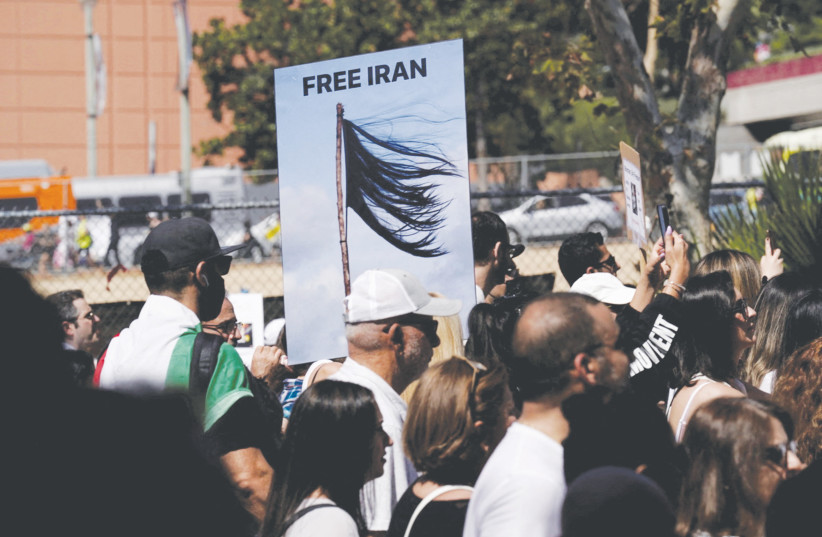(Netanya, Israel) The Iranian uprising against the ayatollah regime got another show of solidarity from the Jewish state with the unveiling of the nation’s fifth wall mural of the “Woman, Life, Freedom” movement in Iran.
For more stories from The Media Line go to themedialine.org
The initiator, Christian Iranian American filmmaker and entrepreneur Hooman Khalili, unveiled Netanya’s second mural at the city’s bustling market Sunday afternoon.
"All the murals are meant to do one thing: Unite Iran and Israel,” he said. “The Iranians and the Jews have been friends for 3,000 years and this is a reminder of our friendship.”
The latest Netanya mural focuses on Ghazal Ranjkesh, an Iranian protester whose eye was shot with a pellet gun during a protest. Iranian security forces are believed to have purposely damaged the eyes of hundreds of men and women in the same manner since the uprising began last September.

Khalili was inspired to paint biblical birds over the missing eyes of the victims. Ranjkesh’s eye is covered by Israel’s national bird, the hoopoe, while in the other Netanya mural Niloofar Aghaee’s eye is covered by Iran’s national bird, the nightingale. The crown prince of Iran, Reza Pahlavi—who is living in exile—visited the mural of Aghaee during his historic trip to Israel last month.
Raising awareness for Iranian freedom
Netanya Deputy Mayor Shiri Hazuel said at the unveiling that these murals raise awareness of the Iranian plight.
“This is a beautiful initiative depicting the voices of women from Iran and this is the second mural we have in Netanya,” Hazuel said on Sunday. “This is the least we can do and we need to do much more for these people who are suffering.”
Deputy Mayor Efraim Bulmash said the city is the perfect place to broadcast this message.
“There is a very large community of Iranian Jews in Netanya and the message of freedom, women, and equal rights plus the issue of the Iranian community [resonates] in Netanya,” he said.
Israeli graffiti artist Benzi Brofman, who also painted the Nazareth mural in this series, called the woman who gave her eye for this cause an “agent of world change.” He painted the “Woman, Life, Freedom” slogan in three languages: English, Hebrew, and Farsi.
Former Knesset Member Ruth Wasserman Lande has been instrumental in finding available walls and permits for the murals around Israel.
In the Bible, over and over, God’s heart is for Jerusalem. … And as I do everything I can to build the bridge between Iran and Israel, I want to keep pointing to Jerusalem.
Born into a Muslim family in Iran, Khalili and his mother moved to America where he became a Christian. Khalili, a filmmaker living in San Francisco, is also a supporter of Israel and makes it a point to reference Jerusalem in the art.
“In the Bible, over and over, God’s heart is for Jerusalem,” Khalili told The Media Line, noting several scriptures that mention the holy city. “And as I do everything I can to build the bridge between Iran and Israel, I want to keep pointing to Jerusalem.”
Widespread demonstrations in Iran were triggered after 22-year-old Mahsa Jina Amini died while in police custody in September after her arrest for failing to wear her hijab according to the nation’s strict religious dress code. Hundreds of protesters have been killed and thousands arrested since then and many women still continue to remove their hijabs in public.
Khalili began erecting murals in Israel in January after an invitation from Jerusalem Deputy Mayor Fleur Hassan-Nahoum, who praised his involvement in Murals for Freedom in the US. The first Israel mural was hung in Jerusalem’s commercial Talpiot neighborhood and features Amini along with Sarina Esmailzadeh, Fereshteh Ahmadi, and Nika Shakarami—four of the earliest protest victims.
He plans to erect 18 total and is already brimming with inspiration for the next few.
“These murals are not meant for us to think about the horribleness of the Islamic regime, but to remind you of Cyrus and Esther and, for those of us that are Christian, the magi—how God keeps using the Persian people over and over again in every single opportunity he has to let the world know, that, ‘Hey, I’m here—look at me,’” Khalili said at the unveiling.
This mural also pleads: “Esthers of the world, rise up,” referring to the Jewish queen of Persia who saved her people from impending annihilation.
